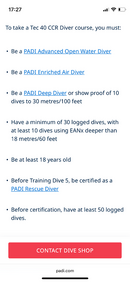This is my first post here. I've learned a ton on this board and I'm grateful for the insights you all provide.
I'm getting into technical diving and I'd like to jump straight into a CCR. Does the group see any benefit or hindrance in skipping open circuit tech training costs and equipment costs and going straight into a CCR? CCR's are obviously an investment. I'd rather not spend money on a new BCD, manifold, tanks, etc., that would only be used specifically for dual-tank open circuit, considering I know where I want to end up already. Let me know your thoughts or if you think this is missed training opportunity.
I'm getting into technical diving and I'd like to jump straight into a CCR. Does the group see any benefit or hindrance in skipping open circuit tech training costs and equipment costs and going straight into a CCR? CCR's are obviously an investment. I'd rather not spend money on a new BCD, manifold, tanks, etc., that would only be used specifically for dual-tank open circuit, considering I know where I want to end up already. Let me know your thoughts or if you think this is missed training opportunity.






